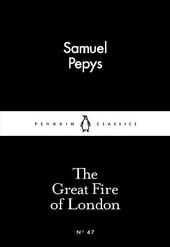
|
The Great Fire of London
Paperback / softback
Main Details
| Title |
The Great Fire of London
|
| Authors and Contributors |
By (author) Samuel Pepys
|
| Series | Penguin Little Black Classics |
|---|
| Physical Properties |
| Format:Paperback / softback | | Pages:64 | | Dimensions(mm): Height 192,Width 125 |
|
| Category/Genre | Literary essays
British and Irish History |
|---|
| ISBN/Barcode |
9780141397542
|
| Classifications | Dewey:941.066092 |
|---|
| Audience | |
|---|
|
Publishing Details |
| Publisher |
Penguin Books Ltd
|
| Imprint |
Penguin Classics
|
| Publication Date |
26 February 2015 |
| Publication Country |
United Kingdom
|
Description
Originally written in code, Pepys' diary includes his unforgettable eyewitness account of the 1666 Fire. 'With one's face in the wind you were almost burned with a shower of Firedrops' A selection from Pepys' startlingly vivid and candid diary, including his famous account of the Great Fire Introducing Little Black Classics- 80 books for Penguin's 80th birthday. Little Black Classics celebrate the huge range and diversity of Penguin Classics, with books from around the world and across many centuries. They take us from a balloon ride over Victorian London to a garden of blossom in Japan, from Tierra del Fuego to 16th century California and the Russian steppe. Here are stories lyrical and savage; poems epic and intimate; essays satirical and inspirational; and ideas that have shaped the lives of millions.
Author Biography
Samuel Pepys was born in London in 1633, the son of a tailor. He was educated at St. Paul's School, London, and Magdalene College, Cambridge. In 1655 he married and in the following year entered the household of his cousin Admiral Edward Montagu. In 1660 he became the Clerk of the Acts to the Navy Board (the same year in which he began his diary). In 1669, the year in which he closed his diary, his wife died. In 1672 he was appointed Secretary to the Admiralty, an appointment he held with one interruption of four years at the end of Charles II's reign until the Glorious Revolution when he retired from public life. As well as being one of the most important civil servants of his age, he was a widely cultivated man, taking a learned interest in books, music, the theatre, and science. He was elected a fellow of the Royal Society in 1684 and later served as President. He died childless in 1703. His contemporary John Evelyn remembered him as 'universally beloved, hospitable, generous, learned in many things'.
|